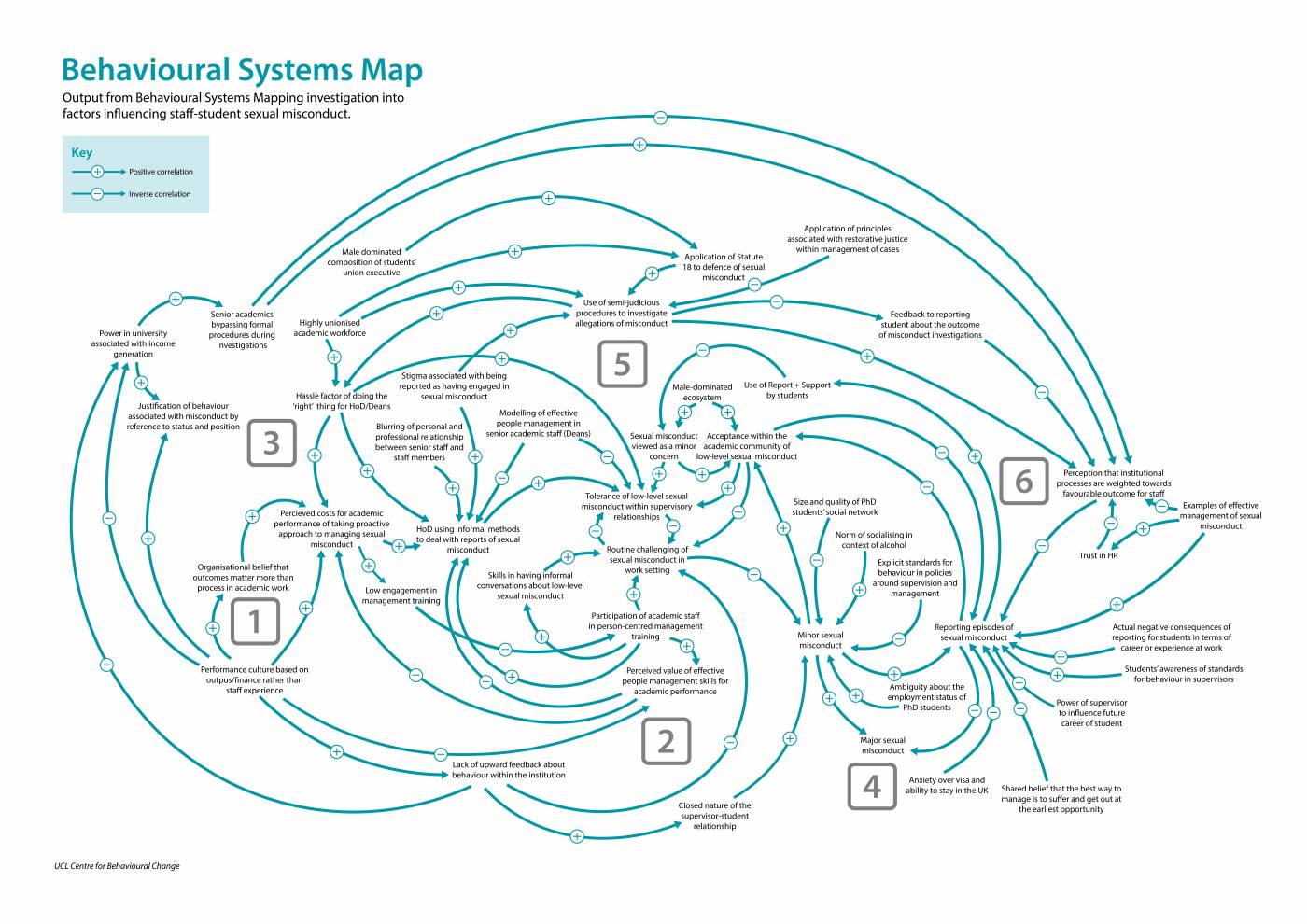The CBC’s interdisciplinary research portfolio addresses central questions facing society, particularly in the fields of health and sustainability.
The CBC collaborates with world-leading institutions and academics from around the world to conduct cutting-edge theoretical, methodological and applied research to advance the understanding of behaviour and how to change it. Our research spans a wide range of settings, populations and domains of behaviour, taking an interdisciplinary perspective and bringing together different sectors to address issues across health, wellbeing, sustainability and social cohesion. We work closely with policymakers, practitioners, industry, patients and the public to maximise the real-world benefit and impact of our work.
Find out more about the latest CBC research news and activities by clicking the links in the research sidebar to the left.
Research Highlights

Human Behaviour Change Project (HBCP)

NIHR Behavioural Science Policy Research Unit

Complex Urban Systems for Sustainability and Health (CUSSH)

Applying behaviour change science to prevent sexual misconduct
Research Themes
Our research activities are organised around three main themes:
Methods for advancing behavioural science and its application
Research to develop methods and tools to further the science and practice of behaviour change, including the synthesis and predictive use of evidence across and within academic disciplines.
- Project focus: The Human Behaviour-Change Project (HBCP)
- The Human Behaviour-Change Project (HBCP), a collaboration between researchers in computer science, behavioural science and system architecture, is creating an automated ‘Knowledge System’ using Artificial Intelligence to extract information from intervention evaluation reports to synthesise findings, answer questions about future scenarios, and draw inferences about behaviour change.

In 2020, we released the ground-breaking Behaviour Change Intervention Ontology (BCIO), providing an knowledge structure for organising and understanding evidence about behaviour change interventions. Machine Learning and reasoning algorithms, drawing on the BCIO, are creating a Knowledge System to automatically identify new relevant research to predict the outcomes of a range of intervention scenarios. The first use case is smoking cessation; the second underway is interventions to increase physical activity. A user interface is being developed to enable policy-makers, planners, practitioners and others to answer variants of the generic question: “When it comes to behaviour change interventions, ‘What works, compared with what, for what behaviours, how well, for how long, with whom, in what setting, and why?’.
Funder: The Wellcome Trust
Partners: IBM Research Dublin, Universities of Aberdeen and Cambridge
CBC lead: Professor Susan Michie
CBC Researchers: Dr Alison Wright, Dr Ailbhe Finnerty, Dr Elizabeth Corker, Candice Moore. Silje Zink, Emily Hayes, Clement Veale.
URL: https://www.humanbehaviourchange.org/ / Twitter: @HBCProject
Health and wellbeing
Focused on understanding and changing behaviour to promote population health to support people to manage their health and enable health care professionals and systems within which they work to deliver evidence-based practice.
- Project focus: NIHR Behavioural Science Policy Research Unit
- NIHR’s Policy Research Unit in Behavioural Science was launched in 2019, with Prof Susan Michie as Co-Director. The unit brings together researchers with a range of disciplinary backgrounds and expertise to inform the design, development, evaluation and implementation of government policy on health, preventing ill-health and health systems. It works closely with the Department of Health and Social Care, in collaboration with other Policy Research Units, to provide the best behavioural science theory, methods, evidence and advice to support decision-making in a timely way, for the benefit of the public and patients.

The PRU aims to conduct interdisciplinary behavioural research to provide the Department of Health and Social Care (DHSC) with timely answers to key policy questions.
Specific objectives are to:
- conduct strategic analyses of how best to apply behavioural science to major policy areas;
- support the development of policies grounded in behavioural science/evidence;
- assess behavioural aspects of current policy to enable learning, identify opportunities for optimisation and to facilitate implementation;
- advise on the design of policy evaluations;
- address evidence gaps relevant to the needs of the DHSC;
- use behavioural science methods to identify effective and cost-effective interventions, including for whom interventions are effective in terms of key equality and diversity issues;
- engage with stakeholders to raise awareness of behavioural science utilisation in policy development, evaluation and implementation; and
- to achieve sustainability of the PRU and to develop capacity in interdisciplinary behavioural policy research.
Funder: National Institute of Health Research
Partners: Newcastle University, London School of Hygiene and Tropical Medicine, University of Cambridge, University of Warwick
CBC Lead: Professor Angel Chater; (Professor Susan Michie – Co-Director 2019-2022) CBC/UCL
CBC researchers: Dr Fabiana Lorencatto, Dr Vivi Antonopoulou, Dr Alison McKinlay, Dr Neil Howlett, and Dr Jorina Von Zimmerman
URL: https://behscipru.nihr.ac.uk/ // https://www.ucl.ac.uk/pals/research/clinical-educational-and-health-psychology/research-groups/health-psychology-research-59
Environment and sustainability
Examines how human behaviour practices and systems can be shaped to improve stewardship of the planet’s resources and to address climate change and pollution.
- Project focus: Complex Urban Systems for Sustainability and Health (CUSSH)
- The negative environmental consequences of human activity represent an unprecedented threat to human health and well-being. Yet, to date, no city has succeeded in implementing a pathway of development that is consistently and demonstrably on track to deliver a long-term environment and health goals that fulfil both local needs and the increasingly urgent imperatives for planetary health.

CUSSH (Complex Urban Systems for Sustainability and Health) is generating evidence and strategies about how to achieve the far-reaching transformation of cities needed to address vital environmental imperatives for population and planetary health in the 21st century, with a focus on reducing carbon emissions. The programme of research uses cutting-edge science and systems-based participatory methods to articulate visions of development, help shape policy decisions, and accelerate the implementation of transformational changes for health and sustainability in low, middle and high-income settings.
This project:
- Articulates the opportunities for achieving major health and sustainability objectives through urban development
- Uses research evidence to inform decision-makers and the public about the pathways of development that provide the greatest opportunities for health and sustainability, and to track progress towards the fulfilment of agreed goals
- Identifies the methods and factors crucial to a successful implementation of development strategies that take full account of the needs and opportunities for health and sustainability in urban living
Funder: The Wellcome Trust: Our Planet, Our Health
Partners: UCL Institute for Environmental Design and Engineering, LSHTM, African Population and Health Research Centre, BuroHappold Engineering, Ecole des hautes etudes en sante publique, Hezl and Environment Alliance, Chinese Centre for Disease Control and Prevention, International Institute for Applied Systems Analysis, Public Health England, University of Peking, University of East Anglia, University of Sydney, University of Wisconsin
CBC lead: Professor Susan Michie
CBC researcher: Dr Jo Hale
URL: https://www.ucl.ac.uk/complex-urban-systems/
Twitter:
 Close
Close


